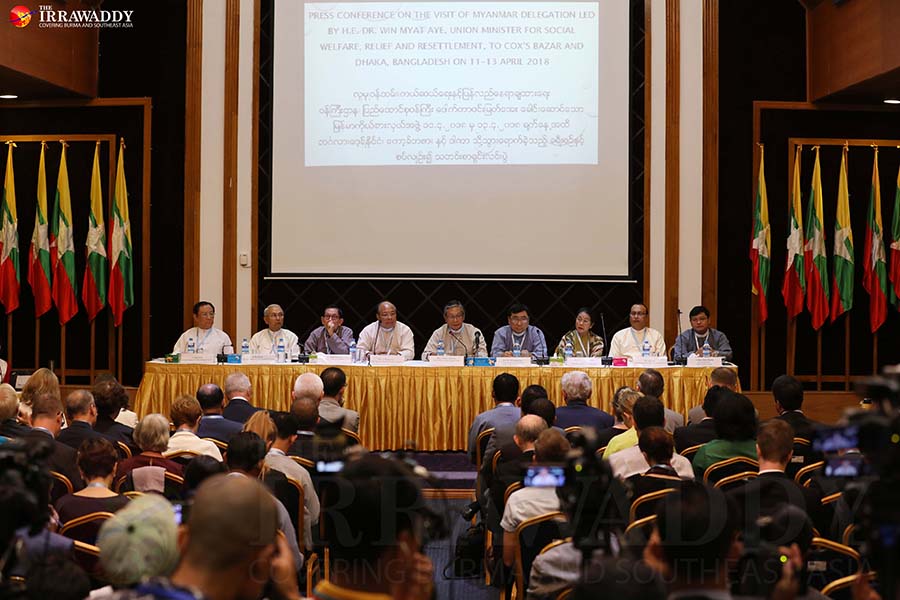YANGON — Myanmar claims that Bangladesh authorities have failed to distribute repatriation application forms to Rohingya refugees its neighbor is sheltering despite a repatriation agreement the two governments signed in November.
The claim came after a 10-member team from Myanmar visited the refugee camps of Cox’s Bazar on April 11-13 to meet some of the 700,000 Rohingya Muslims who have fled to Bangladesh since late August, when attacks on security posts in northern Rakhine State by the militant Arakan Rohingya Salvation Army (ARSA) triggered a military crackdown in the area.
The team included U Win Myat Aye, the social welfare minister, U Aung Htun Thet, deputy head of the government’s Enterprise for Humanitarian Assistance, Resettlement and Development in Rakhine, and representatives from the Myanmar Women’s Federation and different religious communities.
In December, Myanmar handed Bangladesh the application forms it wanted refugees interested in repatriation to fill out, after the two countries had agreed to a Joint Working Group that would vet applicants’ backgrounds to confirm that they had been residents of Myanmar.
The following month, Lieutenant General Kyaw Swe visited Bangladesh to share information about several hundred suspected ARSA members Myanmar believed were hiding among the refugees. At the same time, Bangladesh handed the general forms for 8,032 refugees who had applied for repatriation.
At a press conference on Thursday at the National Peace and Reconciliation Center in Yangon, U Win Myat Aye said the refugee camp representatives his team met last week all said they had never seen any application forms.
“No one knows about the application form,” he said.
U Win Myat Aye said Bangladesh Foreign Affairs Minister Abul Hassan Mahmood Ali and Home Affairs Minister Asaduzzaman Khan admitted that the completed forms for the 8,032 refugees were not the ones the two governments had agreed to.

“They admitted that the forms handed to Myanmar were not the forms agreed to when the [repatriation] deal was signed on Nov. 23, 2017,” he said.
“We are very shocked about the refugees’ claims about the application forms,” said U Hla Tun, who joined last week’s visit to the camps as a Hindu representative.
U Win Myat Aye said Bangladesh’s foreign affairs minister urged the home affairs minister to supply the refugees with the correct application forms and provide Myanmar with the completed applications as soon as possible. But officials at the press conference declined to say whether Bangladesh had an explanation for why the correct forms had not been distributed and filled out to begin with.
The team also claimed that Bangladesh ignored its requests to arrange meetings for the team with Rohingya imams, with refugees Myanmar had already agreed to allow back, and with Hindus who have also fled Rakhine since August. U Hla Tun said Bangladesh authorities replied that the Hindu camp was too far away.
“In fact, the Hindu camp is situated on the way to the Cox’s Bazar refugee camps,” he said.
U Win Myat Aye said the camp representatives were also ill informed about Myanmar’s National Verification Card (NVC) and that he expounded on its virtues. He said he told the representatives that the cards allowed for free movement, doing business, access to education, crossing international borders and fishing near international waters. The minister said he emphasized that cardholders were eligible for citizenship after five months.
“Most of them have no idea about the benefits of holding an NVC,” he said.
However, Myanmar does not grant citizenship to people who identify as Rohingya because the government does not legally recognize them as an ethnic group.
During the team’s visit to the refugee camps, camp representatives presented their own list of 13 demands on Myanmar, including property rights, ethnic rights and education.
On Thursday, U Win Myat Aye said he believed the representatives had been “well trained” to make those demands by people he did not name. Even so, he said the trip had been “very successful” because the two countries were able to clear up some “misunderstandings” and agreed to speed up the repatriation process.
“When we asked the refugees whether they want to come back to Myanmar, all of them unanimously answered that they want to return as soon as possible,” he said.
The Bangladesh Embassy in Yangon did not immediately respond to a request for comment on Friday.

















